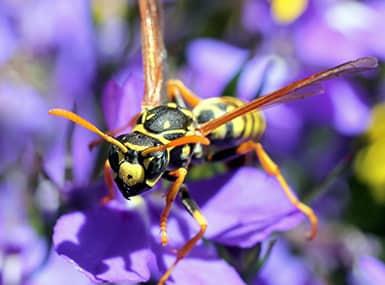As we head into the thick of summer, many of us love the idea of opening a cold can of pop as we sit on the lawn and enjoy the sunshine and the fresh air. Pop isn’t just a favorite for humans, though. The sugar can attract stinging insects such as bees, wasps, yellow jackets, and more. You may want to immediately try to kill these insects and clear them off your property, but doing so can be dangerous.
Why are stinging insects so active right now?
June is the perfect time for bees to start being more active. Many flowers are in full bloom and the warmth is perfect for bees and other stinging insects. During spring you can take some precautions to avoid a bee infestation. Plant gardens further from your house and from areas where you and your family spend time outside. Avoid leaving any standing water which can act as a breeding ground for some insects and will attract others to quench their thirst.
What to do if you have a bee infestation
If you haven’t taken precautions yet, there’s a possibility that bees, wasps, or yellow jackets have already made their homes somewhere on your property. Yellow jackets build nests in the ground, but they can also build nests on the eaves of your house or even in your attic. Carpenter bees can build nests inside the wood of your deck or eaves. If you find a nest of stinging insects or think there may be a colony living nearby, call for help. Professionals at Quick-Kill can take care of the problem for you--so that you can enjoy that pop without company.
Why not do it yourself? Why call a professional?
One of the biggest reasons to call a pest control professional for a stinging insect problem is to know which kind of stinging insect you are dealing with. Carpenter bees look a lot like bumblebees, for example. Some bees, like bumblebees and honey bees, are important for the environment and necessary for the planet’s health. If you spray store-bought treatment on a hive of honey bees, you could be damaging more than just that nest, not to mention provoking a hive full of angry bees looking for revenge. Professionals from Quick-Kill know how to identify each kind of insect and will conduct removal services instead of elimination services for beneficial bees.
Safety First
If you’ve accidentally encountered a nest of yellow jackets, you might know that they can sting repeatedly. Trying to destroy a nest on your own can result in many painful stings, which could cause an allergic reaction for some people. If a nest is near your house, you could also cause damage to the building in your attempts to remove a nest.
It’s much safer to call for help. Quick-Kill Pest Eliminators will determine which kind of stinging insect you have on your property. They will decide if it is beneficial or harmful and use that information to plan a course of action. Treatment from Quick-Kill will have more successful results and a long-lasting impact. Don’t get stung this summer. Calling Quick-Kill for professional help is worth the time, effort, and money.

